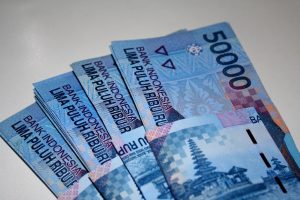Another Indonesian cabinet minister has been arrested on suspicions of corruption, this time for allegedly receiving kickbacks linked to the provision of government COVID-19 social aid packages.
Social Affairs Minister Juliari P. Batubara turned himself into the Corruption Eradication Commission (Komisi Pemberantasan Korupsi, or KPK) in the early morning of December 6. He has been accused of receiving at least 17 billion rupiah ($1.2 million) in payments from two private contractors tasked with putting together aid packages to people impacted by the coronavirus.
Juliari’s surrender came a day after an operation in which KPK officials arrested two private contractors and two officials from the Social Affairs Ministry, and confiscated suitcases and backpacks stuffed with a mix of Indonesian rupiah, U.S. dollars, and Singapore dollars.
In a press conference, KPK Chairman Firli Bahuri said that the private companies, which had won contracts from Juliari’s ministry to supply COVID-19 aid packages, were asked to set aside 10,000 rupiah ($0.71) from each aid package as a kickback for Juliari. The aid involved the distribution of staple foods such as rice and cooking oil to the Indonesian public.
“We will not stop here. We will closely watch how the government’s social assistance is being procured and channeled during the COVID-19 pandemic,” Bahuri said. Juliari, a politician with President Joko “Jokowi” Widodo’s ruling Indonesian Democratic Party of Struggle, could face up to life in prison if found guilty of stealing public money.
Juliari is the fourth minister to be named suspects or convicted in a corruption case during Jokowi’s time in office. Late last month, the KPK arrested Edhy Prabowo, Indonesia’s Minister of Maritime Affairs and Fisheries, as part of an investigation into the lucrative export of lobster larvae. He subsequently resigned. The two recent arrests follow the recent convictions of Youth and Sports Minister Imam Nahrawi and Social Affairs Minister Idrus Marham.
While Indonesia is often held up as a democratic example in Southeast Asia, these recent busts demonstrate just how pervasive corruption remains, more than two decades after the fall of Suharto, who elevated corruption into an entire method of government during his 32 years in power. The arrests are particularly damaging for Jokowi, who was elected in 2014 on promises of accountability and “clean” government.
While the sporadic efforts of the KPK have helped drag the country up the anti-corruption rankings since its establishment in 2003, its powers have recently been watered down by the government. And while the corruption arrests show that the system is to a certain extent working as intended, its recent efforts beg the question of how deep the rot goes. As Aaron Connelly of Singapore’s International Institute for Strategic Studies noted on Twitter, “it is unlikely that these are the only ministers against whom the KPK could bring a case. So the question should be, why them, and not others?”

































